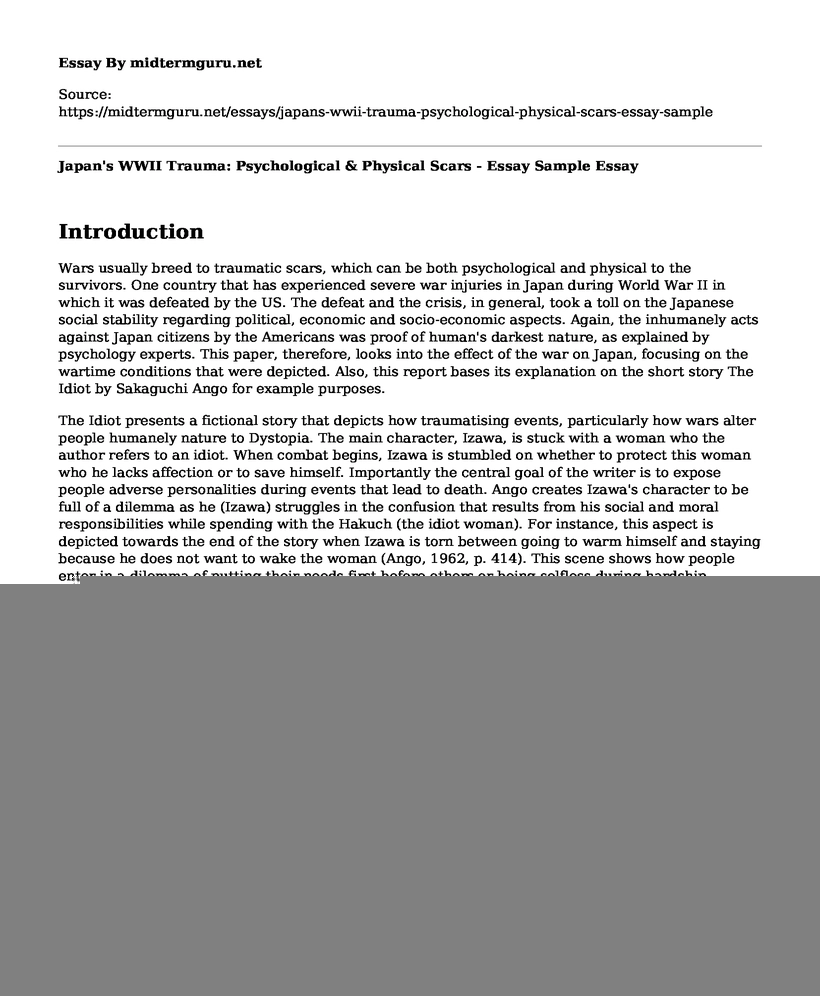Introduction
Wars usually breed to traumatic scars, which can be both psychological and physical to the survivors. One country that has experienced severe war injuries in Japan during World War II in which it was defeated by the US. The defeat and the crisis, in general, took a toll on the Japanese social stability regarding political, economic and socio-economic aspects. Again, the inhumanely acts against Japan citizens by the Americans was proof of human's darkest nature, as explained by psychology experts. This paper, therefore, looks into the effect of the war on Japan, focusing on the wartime conditions that were depicted. Also, this report bases its explanation on the short story The Idiot by Sakaguchi Ango for example purposes.
The Idiot presents a fictional story that depicts how traumatising events, particularly how wars alter people humanely nature to Dystopia. The main character, Izawa, is stuck with a woman who the author refers to an idiot. When combat begins, Izawa is stumbled on whether to protect this woman who he lacks affection or to save himself. Importantly the central goal of the writer is to expose people adverse personalities during events that lead to death. Ango creates Izawa's character to be full of a dilemma as he (Izawa) struggles in the confusion that results from his social and moral responsibilities while spending with the Hakuch (the idiot woman). For instance, this aspect is depicted towards the end of the story when Izawa is torn between going to warm himself and staying because he does not want to wake the woman (Ango, 1962, p. 414). This scene shows how people enter in a dilemma of putting their needs first before others or being selfless during hardship situations.
Notably, the most repeated wartime human condition as projected in The Idiot is aggressiveness. It is usual for a human to be aggressive when they encounter death instincts. The reaction comes out as a repulsive defence mechanism in which people believe that will help them escape death by protecting themselves. In his fictitious story, Ango presents characters that are aggressive during the war that resulted from the chaotic environment. Notably, it is evident that some of them become aggressive to shield themselves from their enemies while others' objective is to hurt the antagonists for their contentment as winners. In the narration, the American army shows their aggressiveness when they lash out bombs to the Japanese houses where they all caught fire killing and hurting people. More so, a lot of properties is destroyed, leaving people, including Izawa and his idiot woman vulnerable with nowhere to hide (Ango, 1962, p. 407). On the same note, Izawa expresses his emotional aggressiveness words the Sakuchi when she becomes restless during the bombings. He angrily shouts at her to protect herself by obeying his orders (Ango, 1962, p. 410).
Again, the aggressiveness human nature in The Idiot pushes people to be ruthless towards one another. The war destroys the character's peace of mind as they become restless while watching over their dear lives. They fail to feel affectionate to one another following the chaotic aspects that surround them toward the wartime. As a result, they treat one another in the most inhumane and disrespectful manner, which, in turn, makes them lose their sanity. This aspect regarding mercilessness is revealed in Izawa mind when he put the woman to sleep and start imaging their capture the American forces. He imagines the woman being raped and sodomised as well as her genital parts being mutilated by the soldiers from the American army (Ango, 1962, p. 414). Besides, the merciless human condition is also reflected when Izawa and the woman together with the other survivors in the neighbourhood walk over piles of corpses that are burned beyond recognition after the bombs by the "enemy planes" (Ango, 1962, p. 404).
Importantly, people's habit of aggression is also painted in their mental-self. Usually, people live harmoniously before a war crisis happens in that they can fight for each other. However, due to the stress that results from war-pressure, they possess an unlikeable personality that makes them their enemy even to those they once cared for. For example, before the war, Izawa was obsessed about having a woman in his life as she would help him pain a respectable status in society (Ango, 1962, p.389). However, when a woman came to his life as had always desired, he ended up resenting her as a burden to protect during the war.
Notably, aggressiveness, as a wartime human condition as depicted in The Idiot can be termed as both human and inhuman act. In the context of humanely act, aggressiveness during war or other problematic situations shields people with confidences and courage to overcome the hurdles. For instance, Izawa aggressiveness enabled him and the woman to survive the bombing tragedy. It is this feeling that gave him the protective gear that most of his fellow kin who had lacked. On the other hand, it caused a lot of damage as people turned against each other, leading to most of them dying or hurt.
References
Ango S. 1962. The Idiot (Translated by Saito G). Modern Japanese Stories: An Anthology.
Cite this page
Japan's WWII Trauma: Psychological & Physical Scars - Essay Sample. (2023, Jan 08). Retrieved from https://midtermguru.com/essays/japans-wwii-trauma-psychological-physical-scars-essay-sample
If you are the original author of this essay and no longer wish to have it published on the midtermguru.com website, please click below to request its removal:
- Issues That Affect the People of District 7 - Problem Solution Essay
- Paper Example on Deferred Action for Childhood Arrivals Program
- Essay on Defining a Great Leader
- Did the Civil Rights Movement or the Vietnam War Have a More Significant Impact on U.S. History? - Essay Sample
- Explore Consciousness - Waking, Self-Awareness and Altered States - Essay Sample
- Spanish Civil War: The 3-Year Conflict Between 1936-1939 - Essay Sample
- Article Analysis Essay on Classicism the Greek Legacy







